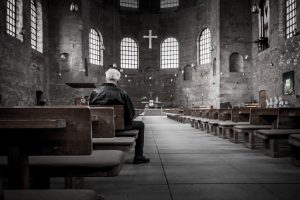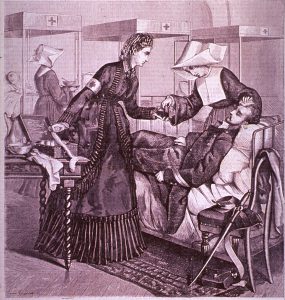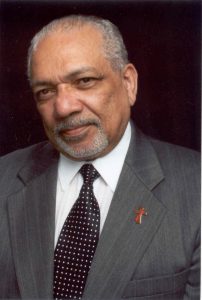 We’re going to start with a difficult but real subject, one that some people might bring to us. I wonder how many of you know about the current problems of the Church in Chile. On May 18, all 31 active bishops of Chile submitted their resignation to Pope Francis because a clergy sex abuse scandal, which had developed over some years, reached its height. In addition, many of the bishops were found to be negligent and a huge part of the problem. When people hear this and other shameful things Catholics have done, they ask us: “Why are you part of a church that does so much evil?”
We’re going to start with a difficult but real subject, one that some people might bring to us. I wonder how many of you know about the current problems of the Church in Chile. On May 18, all 31 active bishops of Chile submitted their resignation to Pope Francis because a clergy sex abuse scandal, which had developed over some years, reached its height. In addition, many of the bishops were found to be negligent and a huge part of the problem. When people hear this and other shameful things Catholics have done, they ask us: “Why are you part of a church that does so much evil?”
Right now, we have eight people in our parish on a journey towards being Catholic (This is the most our community has ever had and it’s something to be celebrated. I can’t tell you how happy I am to see that we also have non-Catholics already serving in hospitality, at Alpha, on the refugee committee—I’ve never seen that, and it’s a sign that our church is open). However, people will ask them, “Why do you want to become Catholic when the Catholic Church has so many problems?” These are fair questions and deserve solid answers.
Here are four ideas that help answer these questions, and today’s Gospel will be the basis of the fourth idea.
1) Every group of people has problems. My friend, Raj, who’s Sikh and very mature, is not shocked by problems in the Catholic Church because he knows there are problems in every group. Every political party has huge scandals. Islam has major problems with violence, does it not? Since last August, 620,000 Muslims have fled the Buddhist-majority Myanmar because of persecution. In Southern India, “there have been more than 15 violent attacks against Christians so far this year” by militant Hindu extremists.
Catholics have done evil things, and we can’t excuse it (We need to face it and own it. Clergy sexual abuse is evil, and the actions of the bishops of Chile are appalling.) Nevertheless, Catholics doing evil things can’t be used as justification to abandon the Church, because every group has sinners. Catholics don’t leave Jesus because of Judas.
2) In my experience, there are two types of people who might ask us the above questions: those who are simply asking a question, and those who are aggressively attacking us. The latter are usually militant atheists or secularists, who advocate for a world without religion, and focus on so-called reason over faith. But I ask them, “Has secularism done more good for society than the Catholic Church?” As secularism has risen in our country, it’s led to the genocide of millions of Canadians through abortion; between 1974 and 2010, there have been 3.1 million abortions in Canada. It’s our current secular culture that’s disintegrating the family, with the increase in divorce, and the devaluation of the family and the roles of mothers and fathers.
We can politely remind our questioners that atheism has caused more murders in history than religion: “Taken together, the Crusades, the Inquisition, and the witch burnings killed… the equivalent of one million… today” (Dinesh D’Souza, What’s So Great about Christianity, 218-219). But focusing on the big three atheist regimes led by Stalin, Hitler, and Mao, they’ve murdered over one hundred million people in one century. Consequently, we could ask a fair question: “Given that atheism has caused so much evil in the world, and still does in places like North Korea, why are you still atheist?”
3) In spite of all the evil things Catholics have done, I choose to remain Catholic because the Church has done tremendous good throughout history, thanks to Jesus. It was the Church that started universities; Britannica.com says that it was Christianity that started modern hospitals because we didn’t isolate sick people from the community but stayed with them; today, the Church is the largest aid organization in the world. The Church has been one of the greatest patrons of the arts, music and literature.
to remain Catholic because the Church has done tremendous good throughout history, thanks to Jesus. It was the Church that started universities; Britannica.com says that it was Christianity that started modern hospitals because we didn’t isolate sick people from the community but stayed with them; today, the Church is the largest aid organization in the world. The Church has been one of the greatest patrons of the arts, music and literature.
“When Thomas Jefferson wrote in the Declaration of Independence that ‘all men are created equal,’ he claimed that this was a self-evident truth. But it is not evident at all”(D’Souza, 70). People are unequal in physical qualities, intelligence, virtue, etc. So where did Jefferson get such a crazy idea? Christianity. Each person is an image of God and therefore is equal in terms of dignity. And this led to the end of slavery and gave us human rights. In China and India, do parents want to have more baby boys or girls? But, in countries influenced by Catholicism, such as in Latin America, “the preference for male children is weaker” (Christopher Kaczor, The Seven Big Myths about the Catholic Church, 76).
The positive influence of Christianity is so great that Jordan Peterson points out that atheists like Sam Harris are actually Christian in their worldview and morality. They say they don’t believe in God, but they act out a Judeo-Christian ethic, and, if we don’t treat them according to this ethic, they become very upset. They got their morality from us.
4) So, why are we still Catholic? Because, as we’ve tried to explain before, Jesus is God and He founded the Catholic Church (See also here and here). But today’s Gospel gives us another insight. Jesus says, “With what can we compare the kingdom of God…? It is like a mustard seed, which, when sown upon the ground, is the smallest of all the seeds on earth; yet when it is sown it grows up and becomes the greatest of all shrubs, and puts forth large branches” (Mk 4:30-32). This is an image of the Church: 2,000 years ago, she was just a small seed with 120 people (Cf. Acts 1:15), but now she’s a large shrub with 1.2 billion people.
Nevertheless, some say, “The Church now doesn’t look like the Church then. Why does the Church have the Vatican? The early Church didn’t.” The Church has the Vatican because, over the years, she kept on constructing more and more beautiful buildings. Another time we’ll deal with the question: “Why doesn’t the Vatican sell all its goods and help the poor?”
In 1998, in Detroit, a Pentecostal pastor named Alex Jones asked his congregation if they wanted to have a first-century Christian worship service. They said, “Yes!” He responded, “Well, give me 30 days. We’re going to do it the way the early Christians did it!” (Deacon Alex Jones, No Price Too High). In those next 30 days, he read early church documents and discovered many surprising facts. Firstly, he found that the Church was liturgical: They had a prescribed system of worship that was uniform and universal. Great preaching and music weren’t the centre as they are today in many Protestant churches, but the Eucharist was, and the early Christians called it Jesus’ Body and Blood—Alex thought those ideas came in the Middle Ages.
Secondly, he learned that the early Church was hierarchical, with bishops, priests and deacons. They didn’t solve their problems by reading the New Testament—there was no New Testament. They followed the bishops, who had been ordained by the apostles.
So he started changing his church to become more like the early Church, and you know what? It started looking more Catholic. Eventually, in 2001, he and 53 members of his Pentecostal church all became Catholic. He said, “I found Jesus’ Church!”
In conclusion, let’s ask ourselves a question, “Why are we (still) Catholic?” or “Why do we want to become Catholic?” Perhaps the answer comes quickly to us, perhaps we have to think more about it. Perhaps we need to answer more questions that we didn’t ask today. But God wants us to have a good answer.
For many of us, in spite of all the problems in the Catholic Church (and there are many, including all of us), we’re Catholic because Jesus died and rose for us, we love Him, and He made a covenant with us. He’s God, and we want to be in the Church He founded, which is the Catholic Church.

